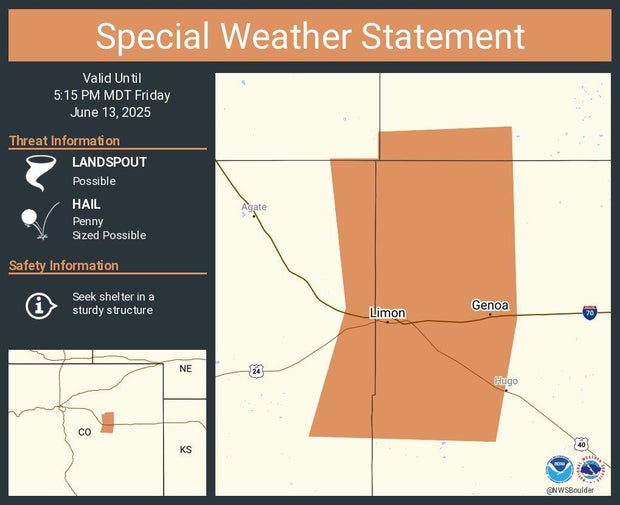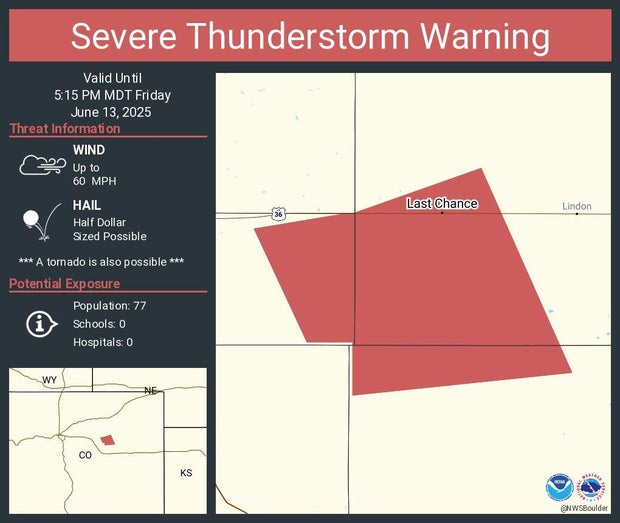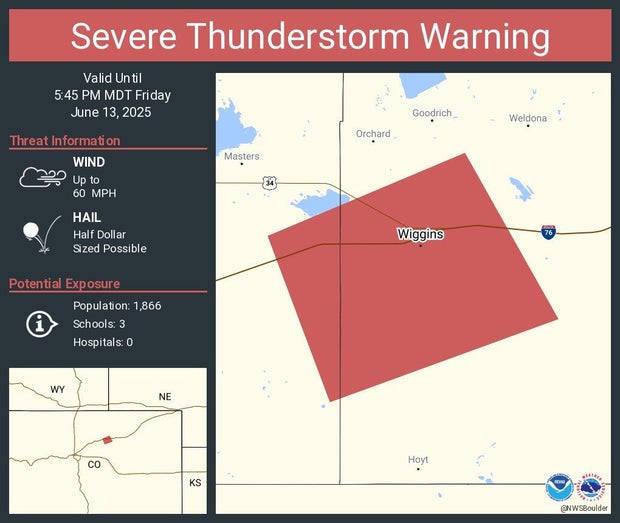Colorado
National Weather Service issues multiple tornado warnings in Colorado

Another round of summer storms moved into Colorado on Friday afternoon, bringing the chance of scattered hail, strong wind gusts and frequent lightning.
The NWS said the severe thunderstorm watch is in effect for much of northeastern Colorado through 10 p.m. As of 4:30 p.m., they have issued two tornado warnings in connection with the storm, one in Adams County south of E. 152nd Avenue and one affecting the areas around Lochbuie and Hudson. Both warnings expired at 4:30 p.m.
A special weather statement warned that a possible landspout may touch down near Limon and Genoa. The warning is in effect until 5:15 p.m.
Last Chance, Colo., is under a severe thunderstorm warning until 5:15 p.m. A severe thunderstorm warning is in effect for Weld County until 5:45 p.m.
This is a developing story. More information will be provided as it becomes available.

Colorado
Avalanche discipline, power play falters, Central Division lead shrinks in 5-2 loss to Wild

The Colorado Avalanche had a chance Thursday night to regain some real separation between them and the Minnesota Wild.
It didn’t happen, and special teams were again an issue.
Minnesota’s Joel Eriksson Ek scored a pair of power-play goals, while the Avalanche took too many penalties and did not convert its chances with the extra man in a 5-2 loss at Ball Arena. The Wild scored on two of six power plays, both in the second period, then added a shorthanded goal into an empty net for good measure.
“We took six (penalties). Six is too many, especially against a power play like theirs,” Avs coach Jared Bednar said. “We had a slow start to the second and then just kind of started getting going, then took a bunch of penalties and kind of took the momentum away and swung it back in their favor again.”
Mackenzie Blackwood was excellent early in this contest and stopped 31 of 34 shots for the Avs in his first start since the Olympic break. Colorado, which went 0-for-3 on the power play, has not scored an extra-man goal in back-to-back games since Dec. 31 and Jan. 3. The Avs are 2-for-31 with the man advantage since Jan. 16, and at 15.1% are last in the NHL.
The Wild are now just five points behind the Avs in the Central Division, though Colorado has two games in hand. Filip Gustavsson made 44 saves for the visitors.
“I think we crated enough chances to win the hockey game,” Bednar said. “We give up the (second power-play goal) and that’s the difference in the hockey game for me. We had a chance (on the power play) … we score and it’s a tie game. We haven’t had an easy time capitalizing on some of our chances that we created in the last month.
“I’d like to see that turn around a little bit.”
Minnesota took advantage of three penalties on Colorado in a span of 53 seconds to take the lead with 2:23 left in the second period. Captain Gabe Landeskog was sent to the box for elbowing Eriksson Ek away from the play at 14:15 and Valeri Nichushkin was called for cross-checking at 15:04.
That gave the Wild a 5-on-3, but it went from bad to worse in a hurry for the home side. Brock Nelson won the 3-on-5 in his own end, but Brent Burns’ backhanded attempt to clear the puck out of the zone went into the stands for a delay of game.
Minnesota had a 5-on-3 for 1:56, which Colorado successfully killed off, but because Burns’ two minutes didn’t start until Landeskog’s penalty ended, there was more 5-on-4 time and Eriksson Ek scored his second of the night. The Swedish Olympian was trying to send a cross-crease pass to Kirill Kaprizov, but it hit the inside of Blackwood’s right leg and pinballed across the goal line.
Because of the extended penalty time, both Eriksson Ek and Boldy officially logged a shift of more than four minutes, leading to that goal.
“I’m not a big fan of the penalties we took, necessarily,” Landeskog said. “Obviously, mine is a penalty. Val, I felt like he was protecting himself and Burns, that’s a penalty. There’s nothing to argue about there. But yeah, that tilts the ice for sure and just gives them unnecessary momentum.
“So yeah, undisciplined and we’ve got to be better there for sure.”
Eriksson Ek put Minnesota in front at 7:48 of the second period. Cale Makar was called for slashing when his one-handed swipe while Yakov Trenin was attempting to shoot from the left wing. Trenin’s stick broke, so Makar went to the box.
Blackwood made the initial save on Matt Boldy’s shot from the high slot, but Eriksson Ek was there near the left post to clean up the rebound.
Martin Necas continued his hot run with a goal to even the score at 13:30 of the middle frame. Nathan MacKinnon picked up the puck in his own zone and carried it into the offensive end. He left a drop pass for Necas near the right point and then played fullback, driving Wild defenseman Daemon Hunt back to give Necas space and then providing a screen on a lethal wrist shot from his Czech linemate.
That was Necas’ 24th goal of the season. He added a second goal in the final minute after the Wild had built a three-goal advantage to give him 25 on the season.
It’s also three in two games since the Olympic break. Necas had three goals and eight points in five games for Czechia at the Olympics in Milan, equaling his country’s record for points at the event.
MacKinnon missed Colorado’s first game back on Wednesday because of maintenance. He actually slipped to third in the NHL scoring race as of Thursday morning, in part because Tampa Bay’s Nikita Kucherov has now has 53 points in his past 23 games to track down MacKinnon and Edmonton’s Connor McDavid to make it a three-man race for the Art Ross Trophy.
McDavid (five times) and Kucherov (three) have combined to win the Art Ross in eight of the past nine years. MacKinnon has never won it, but has finished second each of the past two seasons.
Minnesota scored a second goal off a Colorado player to make it a 3-1 game and then added two empty-net tallies around Necas’ second goal to seal the Wild’s sixth win in a row.
Want more Avalanche news? Sign up for the Avalanche Insider to get all our NHL analysis.
Colorado
Firefighters stop spread of wildfire in Colorado’s Golden Gate Canyon

Late Thursday morning, a house fire spreading into the nearby woods in Colorado’s Golden Gate Canyon prompted officials to issue a pre-evacuation order to nearby residents. Firefighters have since brought the blaze under control.
According to the Jefferson County Sheriff’s Office, a house fire broke out around 11:30 a.m. in the 10600 block of Ralston Creek Road in Golden Gate Canyon, located around 25 miles west of Denver. The fire then began to spread into the nearby trees and grass.
Multiple fire units quickly responded to the scene, and the JCSO issued a pre-evacuation notice to all residents within a three-mile radius, warning them to be prepared to leave at a moment’s notice.
At 12:34 p.m., the sheriff’s office announced that the fire is no longer spreading and the burn area has been contained to less than an acre. A photo shared by JCSO shows a structure nearly completely destroyed by the fire.
Pre-evacuation orders were lifted around 1 p.m.
Colorado
Toyota Game Recap: 2/25/2026 | Colorado Avalanche

ColoradoAvalanche.com is the official Web site of the Colorado Avalanche. Colorado Avalanche and ColoradoAvalanche.com are trademarks of Colorado Avalanche, LLC. NHL, the NHL Shield, the word mark and image of the Stanley Cup and NHL Conference logos are registered trademarks of the National Hockey League. All NHL logos and marks and NHL team logos and marks as well as all other proprietary materials depicted herein are the property of the NHL and the respective NHL teams and may not be reproduced without the prior written consent of NHL Enterprises, L.P. Copyright © 1999-2025 Colorado Avalanche Hockey Team, Inc. and the National Hockey League. All Rights Reserved. NHL Stadium Series name and logo are trademarks of the National Hockey League.
-

 World1 day ago
World1 day agoExclusive: DeepSeek withholds latest AI model from US chipmakers including Nvidia, sources say
-

 Massachusetts2 days ago
Massachusetts2 days agoMother and daughter injured in Taunton house explosion
-

 Montana1 week ago
Montana1 week ago2026 MHSA Montana Wrestling State Championship Brackets And Results – FloWrestling
-

 Oklahoma1 week ago
Oklahoma1 week agoWildfires rage in Oklahoma as thousands urged to evacuate a small city
-

 Louisiana4 days ago
Louisiana4 days agoWildfire near Gum Swamp Road in Livingston Parish now under control; more than 200 acres burned
-

 Technology6 days ago
Technology6 days agoYouTube TV billing scam emails are hitting inboxes
-

 Denver, CO2 days ago
Denver, CO2 days ago10 acres charred, 5 injured in Thornton grass fire, evacuation orders lifted
-

 Technology6 days ago
Technology6 days agoStellantis is in a crisis of its own making
























